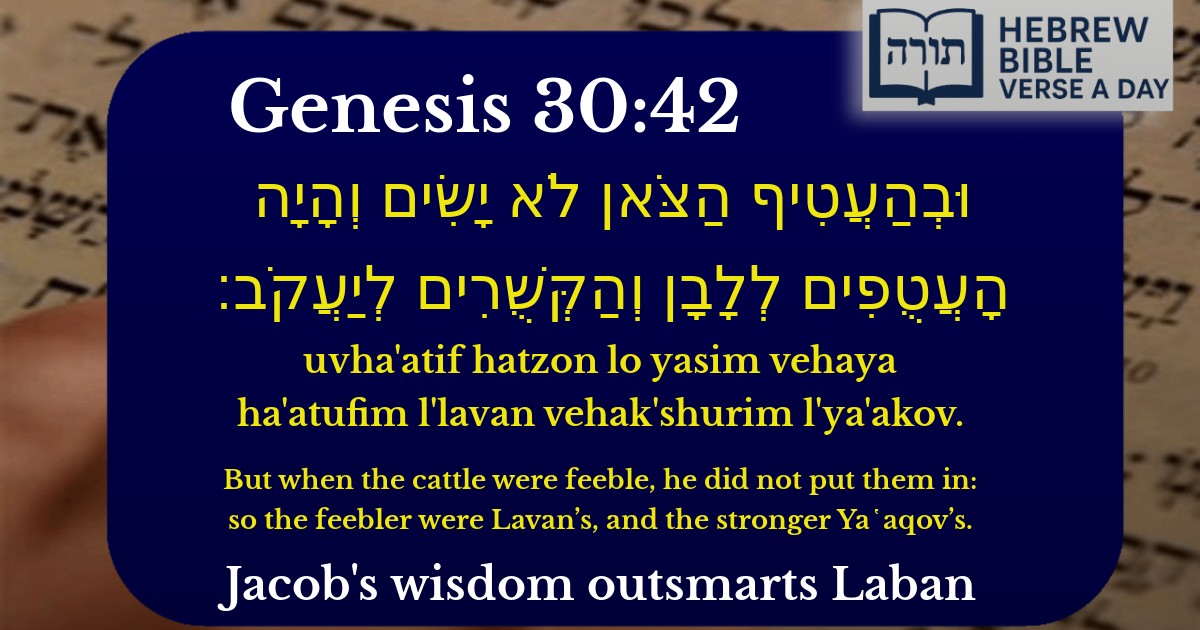Frequently Asked Questions
Q: What does Genesis 30:42 mean?
A: This verse describes Yaakov's clever method of breeding the stronger sheep and goats for himself while leaving the weaker ones for Lavan. According to Rashi, Yaakov placed peeled branches in the watering troughs when the stronger animals mated, influencing their offspring to be robust. This was part of the agreement between Yaakov and Lavan regarding the division of the flocks.
Q: Why did Yaakov only take the strong animals?
A: Yaakov acted according to the terms he made with Lavan (Genesis 30:31-34), where Lavan agreed that Yaakov could take all the speckled and spotted animals. Through Divine intervention and Yaakov's wisdom (as explained by Ramban), the stronger animals tended to be born with these markings, fulfilling Hashem's promise to bless Yaakov (Genesis 30:30).
Q: What lesson can we learn from Genesis 30:42?
A: The verse teaches us about hashgacha pratit (Divine Providence) and human effort. While Yaakov used natural methods (the branches), the Torah makes clear that his success ultimately came from Hashem's blessing (Genesis 31:9). This shows the Jewish approach of hishtadlut (making proper effort) while recognizing that results come from Hashem.
Q: How did Yaakov's method with the branches work?
A: Rashi explains that Yaakov peeled white streaks in the branches, creating a visual stimulus that influenced the animals' offspring. The Midrash (Bereshit Rabbah 73:10) adds that this was a natural method allowed by Torah, not magic. Ramban notes that this was a segulah (spiritual remedy) that worked because Hashem willed it to fulfill His promise to Yaakov.
Q: Why is this story about Yaakov and the sheep important?
A: This episode shows how Yaakov rightfully earned his wealth despite Lavan's constant attempts to deceive him. The Talmud (Bava Metzia 42a) learns from here principles about honest business dealings. It also demonstrates that Hashem protects those who are faithful, as Yaakov later testifies (Genesis 31:7) that Hashem didn't allow Lavan to harm him.


Context of the Verse
The verse (Bereshit 30:42) describes Yaakov's strategy in breeding Lavan's flocks, where he ensured that the weaker animals remained with Lavan while the stronger ones became his own. This was part of the agreement between Yaakov and Lavan, where Yaakov would take the speckled and spotted sheep and goats as his wages.
Rashi's Explanation
Rashi (Bereshit 30:42) explains that when the animals were in their weakest state (during mating season), Yaakov did not place the rods he had prepared (as described in the previous verses) in front of them. As a result, the offspring born from those unions were weak and remained Lavan’s property. Conversely, when the animals were strong, Yaakov used the rods, leading to robust offspring that became his own.
Ibn Ezra's Insight
Ibn Ezra (Bereshit 30:42) adds that Yaakov's actions were not merely natural breeding techniques but were guided by divine intervention. Hashem ensured that Yaakov’s flocks would prosper as a fulfillment of His promise to protect and bless Yaakov despite Lavan’s deceitful behavior.
Midrashic Interpretation
The Midrash (Bereshit Rabbah 73:10) elaborates that Yaakov’s wisdom in managing the flocks was a reflection of his righteousness. The verse highlights the principle of "measure for measure"—just as Lavan attempted to deceive Yaakov repeatedly, Hashem orchestrated events so that Yaakov would rightfully receive his due.
Halachic Perspective (Rambam)
Rambam (Hilchos Sekhirut 13:2) cites this episode as an example of permissible conduct in business agreements. Yaakov acted within the terms of his contract with Lavan, demonstrating that one may use wisdom and strategy to secure fair compensation, provided there is no outright deception.
Symbolic Meaning